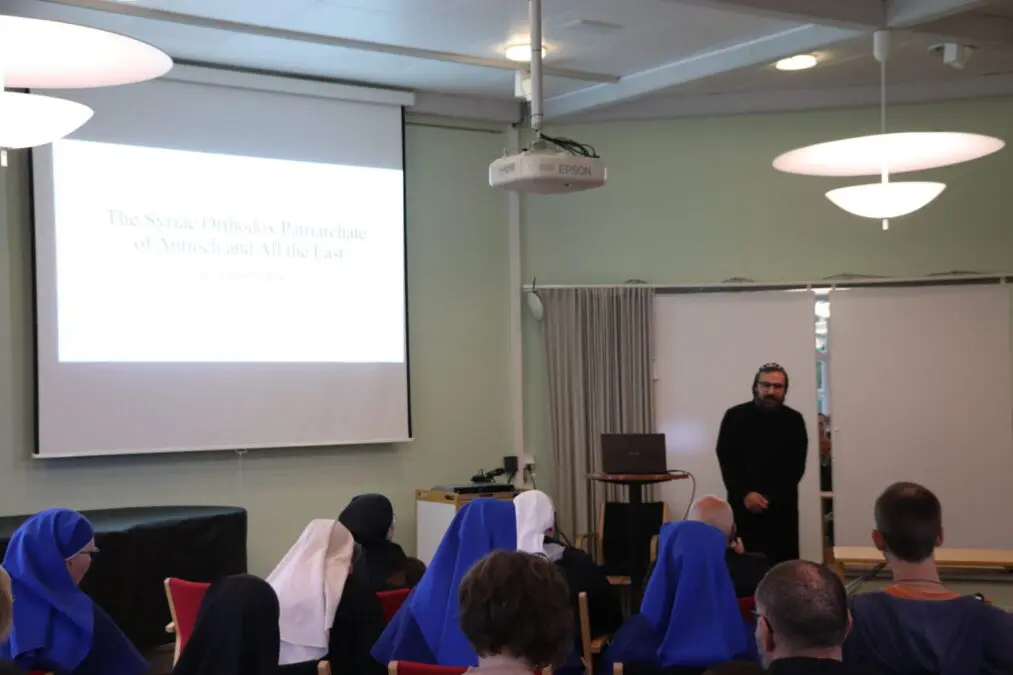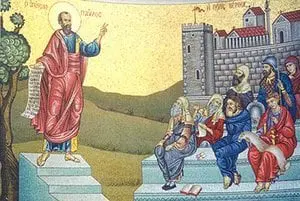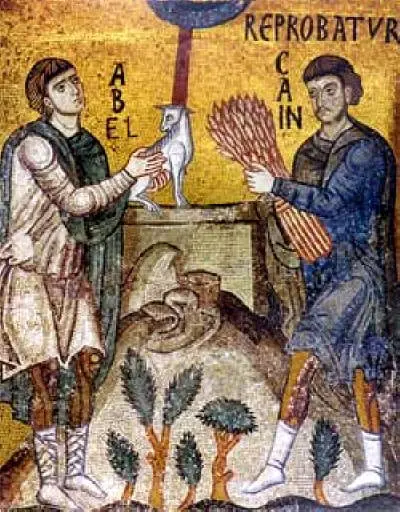By Br. Charbel Rizk (Syriac Orthodox Patriarchate of Antioch and All the East)
What is the purpose of this life, this monastic life, that we are living? As monks and nuns, we do many things. Sometimes too many things. Often we find ourselves compelled to do them. When we came to Sweden from Syria to establish our monastic life here, we had to do many things. And we are still doing many things. And I think that we will continue to have to do many things. People come to us. We cannot tell them to go away. In fact we believe that Christ sends them to us. But why? Why to us? They come with heavy hearts, wounded hearts. They come with difficulties. We listen. They speak. Then they become quite and expect answers. Unfortunately for us some expect direct answers that might solve their difficulties, heal their wounded hearts, relive their heavy hearts. At the same time we wish they could see our own difficulties, our own wounded hearts, our own heavy hearts. And perhaps they do. The world is suffering. All of us are suffering for various reasons. This is an existential reality that cannot be denied. Realizing this insight and accepting it, not escaping it, is what gives meaning to our monastic life.
We are simply members of a suffering humanity, not of an evil one. Suffering is painful. Suffering can make us blind. A blind man in pain will most likely harm others. Willingly, yes, but his will is infected. He is responsible, but also afflicted. No one is evil, but everyone is suffering. This is our condition. What can we do about it? We pray, or to be more precise, we live prayerfully like Christ. This is the purpose of our monastic life, to live prayerfully like Christ. On the Cross, suffering immensely, he said prayerfully, “Father, forgive them, for they do not know what they are doing.” (Lk. 23:34) Truly, blinded by our pain, we lose our discernment. Thus we do not know what we do. In his suffering, Christ did not lose his discernment. Why? Because he is the perfect man. He is the true man. And he is the beginning of the renewal of humanity. He is our healing.
“Those conflicts and disputes among you, where do they come from?” asks James in his letter. And he goes on explain, “Do they not come from your cravings that are at war within you? You want something and do not have it, so you commit murder. And you covetsomething and cannot obtain it, so you engage in disputes and conflicts.” (Jas. 4:1–2)
Disputes and conflicts, and all kinds of harm, come from our passions, from our wounded hearts. We were not created like this. Nor were we created to be like this. But we became like this. This is the situation of our fallen humanity. This is the situation of each one of us. We can certainly spend all of our time, and even all of our life, on figuring out whom to blame for our wounds. If we chose to spend some time on doing this, we will, if honest enough, realize not only that we have been harmed by others, but also that we have harmed others. So, whom are we to blame for the wounds of humanity? Humanity, that is, us. Not him, not her, not them, but us. We are to blame. It is just that we are to blame, each one of us.
However, on the Cross, Christ blamed no one. While in pain, he forgave all. Throughout his life, he poured out grace on humanity. In his suffering, we are indeed healed. He blamed no one. He healed everyone. This he did in his suffering.
We have chosen to live a life of prayer, constant prayer, yes, a persistent prayerful life. What does this mean? It means to follow Christ with no compromises. “Let the dead bury their own dead, but as for you, go and proclaim the kingdom of God.” (Lk. 9:60) It means to forgive while being crucified. It means to blame ourselves, and not anyone else, for our wounds. In ourselves, everyone else is present. In us, we carry all. We are humanity. When we blame ourselves, we blame humanity. And we should blame it so as to realize that it needs healing. Similarly, when we heal ourselves, we bring healing into humanity. In the process of healing our own wounds, we are in the process of healing the wounds of humanity. This is our ascetic struggle.
Since the beginning, healing one’s wounds has been the purpose of monastic life. This is a noble cause, not to be taken lightly. It is indeed difficult. Almost impossible. Certainly so without the salvific life of Christ. He has restored humanity, re‑created it, and given it his purifying commandments, by means of which we in our pain find healing. The heart that is unable to love will be healed by his commandment to love. And to love while not wanting to love is the greatest of all struggles. To place others before oneself while not wanting to do so is similarly the greatest of all struggles. In a word, to keep his commandments is the greatest of all struggles, and if we succeed in this struggle, we not only heal our wounds, but also bring healing to humanity.
The people who come to us with wounded hearts remind us of the purpose of our monastic life. We listen with our hearts. We carry their difficulties in a hidden way in our own wounded hearts. Thus their wounds and ours become united in one heart, in one wounded heart, in the wounded heart of humanity. And in the process of healing our own wounds, theirs are also healed in a mystical way. This is our firm belief which gives great purpose to our silent life.
Hearts troubled by their own passions become easily judgmental when listening to the difficulties of others, especially when their difficulties appear to be the result of their own faults. Wounds are, however, healed not by judges but by physicians. If we, therefore, want to participate in the healing of humanity, we should act not as judges but as physicians. Upon listening carefully to patients describe their pains, wise physicians prescribe treats that they by experience know work. As monks and nuns, following Christ, we hopefully listen carefully to the wounded humanity, identify with it, suffer with it and heal with it. We need to be wakeful and honest so as not to slip and fall. If we do, we should immediately rise with repented hearts and take this as a reminder that we too are wounded humans like all other humans, struggling in the difficult path of healing. Never should we try to explain away our slipping and falling.
Unfortunately, in the history of the Church, there has been not only too much slipping and falling, but also too much trying to explain it away. We have divided the body of Christ. And instead of rising with repented hearts when slipping and falling, we have turn the entire world upside down, making it appear that all other Christians are slipping and falling, while we are the only ones standing perfectly and firmly upright. Is anyone really convinced by the statement that a certain church is completely innocent while the other churches are completely guilty? All of us are guilty in one or another way. Yet only those of us who heal their wounds are capable to see their guilt, confess it and repair the harm that each one of us have caused to the Church.
Ecumenism is in great need of our monastic life. However, wounded hearts can hardly unite the divided Church. In the process of healing our wounds, we will be able to help restore the divided Church.
Certainly, the questions and issues pertaining to the ecumenical relations and dialogues between our churches are many. As a Syriac‑Orthodox, reflecting on all of this, I find myself somewhat overwhelmed with mixed feelings and at times even with frustration and disappointment. I ask myself, what exactly are the conditions that need to be meet for unity? Have these been discussed and clarified? Have the churches different conditions? As a Syriac‑Orthodox, I know that the Christological question is of foremost importance. The Syriac‑Orthodox Church, like the other so‑called oriental churches, reject the Council of Chalcedon, which is regarded as the fourth ecumenical council among other churches, including the Roman-Catholic, the Anglican and the Lutheran. For many centuries, that is, since the fifth century until the past century, Syriac‑Orthodox Christians were viewed as holding a heterodox Christology, that is, somehow denying the perfect humanity of Christ. In fact, this has never been the case. The Syriac‑Orthodox Church, although rejecting the Council of Chalcedon, has always held that Christ, being one subject or individual, is perfect in his humanity and perfect in his divinity. The Syriac‑Orthodox Church’s rejection of the Council of Chalcedon has to do with how it historically understood the Council’s Christological formulation that Christ has or is in two natures. In a word, the Syriac‑Orthodox Church, historically speaking, understood the Chalcedonian Christological formulation to mean that Christ is two subjects or individuals. However, thanks to the ecumenical relations and dialogues of the past century, it has become clear enough that neither the Syriac‑Orthodox Church nor the Chalcedonian churches holds a heterodox Christology. Although our churches have their own particular ways of speaking about the mystery of the Incarnation, a common Christological understanding is perceived and acknowledged.
Now, if there is a common understanding in regard to Christology — and what could possibly be more important that Christ?! — then I ask myself, how far are we from unity of faith? And do we need more then unity of faith in order to share the Lord’s Eucharist which is the ultimate sign of unity in Christ? Or are we expecting other things from each other? What are we expecting for unity? Maybe, the main obstacle for unity is our own divided hearts?
When we were asked to participate in this gathering, and when we learnt that the aim of the gathering is to pray together for unity, we felt very blessed, as we realized that this is a perfect expression of our monastic life. Just as humanity needs healing, so too the Church needs healing. And just as our own healing brings healing into humanity, so too our own healing brings healing into the Church. We also felt very blessed when we were asked to welcome you in our newly established community here in Sweden. This community is, as it were, a 3-year‑old child, newly born into the world and the Church for the healing of both. To have you here, in this initial state, is a great blessing. Your prayers here will fortify this consecrated place, this place of prayer, this place of healing.
Being together here, during these days, is indeed a blessing for us, but at the same time, this uncovers our shared wound. To see the Lord’s Eucharist prepared and celebrated by each tradition but not shared by all of us uncovers our shared wound. How do we feel when we prepare and celebrate the Lord’s Eucharist in the presence of brothers and sisters whom we, or at least some of us, cannot invite to share? Do we not hear Paul’s words echoing and burning in the conscience of our wounded hearts?
I am speaking the truth in Christ — I am not lying; my conscience confirms it by the Holy Spirit —I have great sorrow and unceasing anguish in my heart. For I could wish that I myself were accursed and cut off from Christ for the sake of my own brothers and sisters, my own flesh and blood. (Rom. 9:1–3)
If we do, let us keep praying. Let us hold on to our monastic life. Let us know that we are sharing a wounded heart. And let us hope that in the process of healing our wounds, we will be able to help restore the divided Church.
Note: Text presented to the participants of the 22nd gathering of the Conference of International Interconfessional Religious took place this year in Sweden, September 2023.







